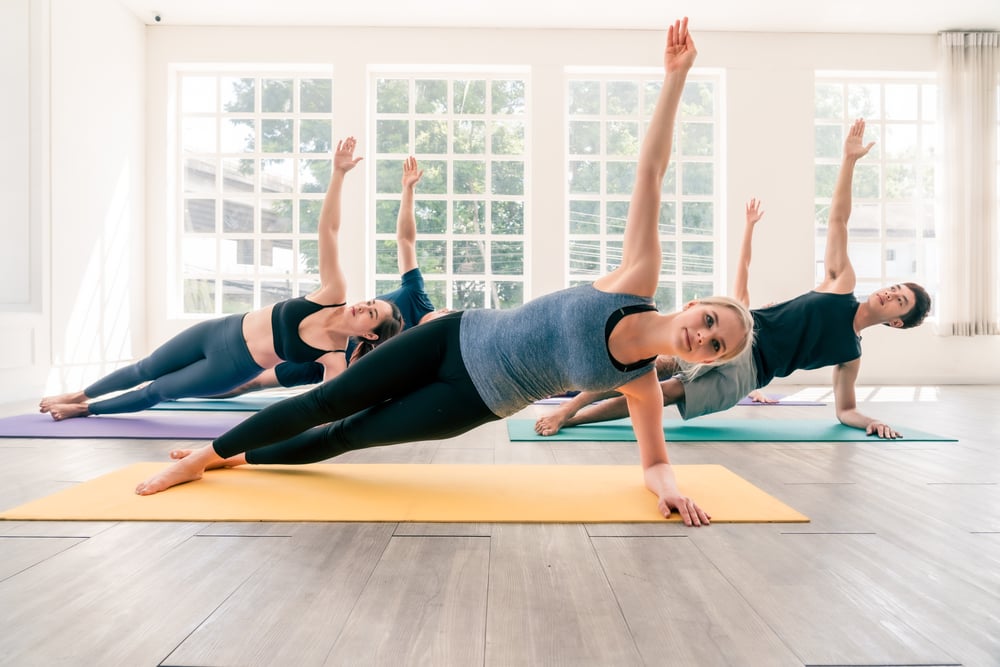Pilates is a type of exercise that focuses on controlled, precise motions, along with steady breathing techniques, to deliver a full-body workout.
It almost looks like a mix of yoga, ballet and aerobics with its low-impact moves. This makes it perfect for postnatal mums or anyone who prefers something less intense.
However, don’t let its gentle exercises fool you. Pilates still packs a punch in terms of what it delivers when building core strength, flexibility and posture!
Keen to start your Pilates journey? Keep reading to discover the best Pilates classes near you that we’ve carefully curated on Loopla.
What kind of exercise is Pilates?
Pilates is a type of exercise that focuses on core strength, muscle balance and flexibility. It involves a controlled set of movements, sometimes done on an exercise mat or specially designed Pilates equipment. (1)

Find Pilates classes near you: View Pilates classes
What is Pilates good for?
Pilates classes are good for:
- Full-body workout
- Core strength
- Flexibility
- Relaxation
Reformer Pilates
Reformer Pilates refers to a type of Pilates exercise that involves the use of a specially designed reformer machine. It looks like a bed frame with springs, straps, and a bar attached to the ends. (2)
The machine adds extra resistance to the movements compared to Pilates moves, which are only done on an exercise mat.
It can deliver a full-body strength and core workout while still being low-impact. This makes it suitable for a wide variety of fitness levels.
In a typical reformer Pilates class, you might do exercises like leg circles or rowing. (3)
Pregnancy Pilates
Pregnancy Pilates is based on regular Pilates, except that it’s specifically tailored to meet the needs of expectant mothers.
This means that you’ll still get the strengthening, core-building, and stretching benefits of regular Pilates — but the exercises will be modified to be gentler and less strenuous.
There might also be more emphasis placed on exercises that target specific pregnancy needs, like breathing, pelvic floor muscle strengthening, and alleviating lower back pain.
Postnatal Pilates
Postnatal Pilates is based on traditional Pilates, which is famous for core-building and strengthening. However, the moves tend to focus more on muscle groups that might be weakened during pregnancy and delivery, like the pelvic floor and lower back muscles.
They will also keep the other needs of new mums in mind, ensuring that the moves are gentler. Many classes accommodate having your baby close by.
Check out LIFE by Margot if you’re looking for a low-impact, full-body workout in London to rebuild your body after birth!

Find Pilates classes near you: View Pilates classes
Is Pilates good for the postnatal period?
Pilates can be a great exercise for the postnatal period. It focuses on many of the physical needs of the postnatal body, like improving core strength and posture, in a low-impact way that won’t put too much strain on your body. (4)
How soon can I do Pilates after giving birth?
If you’ve had a natural birth without complications, it’s usually safe to begin Pilates after the first postnatal check-up with your doctor (usually done 6-8 weeks after birth). Use the session to check with your doctor if you’re physically ready to start exercising again. If you’ve had a C-section, this wait time could be longer.
Even if you’ve got the green light from your doctor to start exercising, don’t forget to pay close attention to your body’s signals. If you experience pain or discomfort while exercising, stop and take a break. It’s important to take it slow and steady to avoid injury and support your body as it continues to heal and recover.
What Pilates exercises should I avoid postpartum?
After birth, it’s important to avoid any Pilates exercises that might put excess strain on your abdominal muscles, as they can weaken after childbirth. This may include any exercises that resemble traditional crunches, sit-ups, or planks. (5)
Mum and baby Pilates
In mum and baby Pilates, you’ll get to rebuild your strength and flexibility while baby gets to hang out with you! Your little one will usually relax on a mat next to you or even join in on the fun for certain moves. For example, you might hold your baby while doing lunges.
We’re currently enjoying the relaxed and supportive postnatal Pilates classes given by Pilates with Sophie in London. They keep class sizes small for more personal attention, and babies are welcome too!
One-to-one Pilates
One-to-one Pilates lessons are a great way to get individualised attention and reach your personal fitness goals.
This means that you and your instructor will work together to develop a plan that is tailored specifically to your body’s needs. You can also get more one-to-one help, which can help you develop good techniques.
Pilates classes in London
Pilates with Sophie offers relaxed Pilates classes in London that are tailored to your postpartum needs. Babies are welcome to join in!
LIFE by Margot runs low-impact postnatal Pilates classes in London to deliver a full-body workout. Their technique utilises small, precise movements to make big differences in strengthening your body after birth!
FAQs: Pilates classes
Which is harder, yoga or Pilates?
Both yoga and Pilates deliver a hard workout, depending on how intense you want it to be. Regardless of which you choose, both require holding postures and focusing on your breath while coordinating precise movements.
If you’re doing either exercise after birth, it’s important to attend proper postnatal yoga or Pilates classes that have your post-birth physical needs in mind and take it slow as your body is still recovering.
Can you shape your body with Pilates?
Pilates is great for body shaping because the movements help to tone and stretch multiple muscle groups, enabling you to develop a long and lean look. (6)
Is Pilates good for mum pouch?
Yes, Pilates can be good for mum pouch because many of its poses and moves focus on building core strength in a controlled, low-impact way.
Is Pilates a good way to lose weight?
Pilates can be a good way to lose weight when paired with other healthy lifestyle habits, like having restful sleep and a balanced diet.
References
- “Pilates — health benefits”, Better Health Channel
- “What is the Pilates Reformer: Benefits and How To Use”, Marguerite Ogle – very well fit
- “Top 10 reformer Pilates exercises”, Fast Twitch
- “What are the benefits of postnatal Pilates?” Amberley Davis – Patient
- “Postpartum/Postnatal Pilates Guide”, Pilates Anytime
- “These 19 Benefits of Pilates Will Inspire You to Fire Up Your Core”, Roxy Menzies – Healthline

